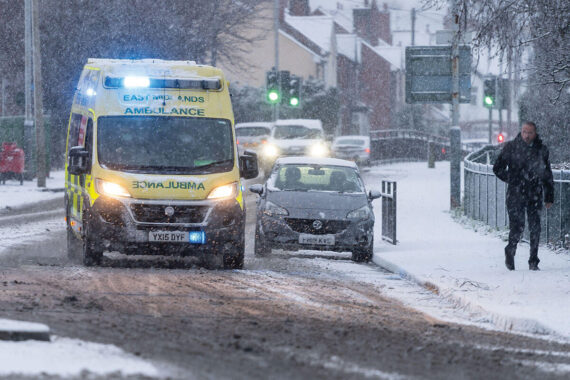NHS facing ‘most difficult start to year ever’ due to strikes

This month could be one of the ‘most difficult’ starts to the year the health service has ever experienced, NHS England has warned today ahead of upcoming strikes.
Junior doctors will begin another period of industrial action tomorrow, lasting for six days until 9 January.
This is the longest consecutive period of strikes ever taken in the history of the NHS, and it follows three days of junior doctor action before Christmas.
NHS England has warned that the upcoming strikes will have ‘an enormous impact’ on routine care and will exacerbate pressures caused by seasonal illness and staff absence.
Last week the average number of people in hospital with flu (942) was almost six times the number from the week before.
Hospitals will prioritise urgent and emergency cases as consultants cover striking junior doctors – the most recent period of action resulted in ‘thousands’ of postponed appointments.
Despite pressures, NHSE has encouraged people to continue using 111 online, GP services, and A&E in emergency situations.
Junior doctors voted for these strike dates at the start of December after rejecting the Government’s pay offer – this followed five weeks of ‘intense negotiations’.
NHS leaders later indicated that hospitals may have to discharge patients earlier in order to ‘maintain flow’ during the industrial action.
NHS England’s national medical director Professor Sir Stephen Powis said today: ‘This January could be one of the most difficult starts to the year the NHS has ever faced.
‘Six consecutive days of industrial action comes at one of our busiest periods – the action will not only have an enormous impact on planned care, but comes on top of a host of seasonal pressures such as covid, flu, and staff absences due to sickness – all of which is impacting on how patients flow through hospitals.’
Despite ‘extensive preparations’, he warned that NHS staff are starting the new year ‘on the back foot’, and the industrial action ‘will continue to have a serious impact in the weeks after’.
Surrey GP partner Dr Dave Triska told Pulse that this morning has been the ‘worst start to the year’ that he has ever experienced.
‘Currently it’s 11:35am and we’ve had 186 patient queries so far – on a normal day we average about 160-170 for the whole day. So there’s massive amounts of seasonal illness,’ he said.
He added: ‘The problem is in years gone by people would have access to PCRs, so they’d do their test and sit at home and wait for it to get better.
‘But they now all present with on the surface physically significant illness and without a differentiating diagnostic test, there’s no choice but to actually assess them in person because you can’t tell if that’s serious pneumonia, sepsis – we’ve had all of that happen in the last week.
‘So it’s making a massive haystack to find the same number of needles in, so it’s a lot of pressure on services to not mess up and not cause harm due to over-work, which is not insignificant.’
However, Dr Triska said it is ‘disingenuous’ of NHS England to link January pressures to the junior doctor strikes and highlighted that data such as appointments cancelled show the strikes ‘have minimal impact’.
Dr Triska said: ‘What they should say is “we’re under-resourced, we don’t have enough beds, this has been predicted for the last four or five months, and here we are again in another crisis situation”.’
Association of Greater Manchester LMCs chair Dr Amir Hannan said the pressure in general practice ‘is not about the six-day strike’ but due to ‘chronic under-funding’ of primary care.
‘If we had a fully-funded primary care system and GP service with a full complement of doctors, nurses and staff, then we’d probably be able to cope much better than we are doing,’ he said.
Dr Hannan told Pulse that NHS England is ‘blaming junior doctors for something that has been going on for a long time’ and they should instead recognise that more NHS investment is needed.
He said: ‘At the moment there’s a deluge of calls for minor ailments, typical upper respiratory tract infections […] that’s to be expected.
‘It’s become much easier now for people to put requests in for appointments because they can just go online and do it so hence they have done.
‘The question is more about how the NHS is supporting us in the frontline, and are we being given the resource to maintain that demand.’
In October, NHS England formally warned the BMA about the ‘cumulative’ impact of the doctor strikes which were causing ‘significant disruption and risk to patients’.
A recent Health Foundation report found that the NHS waiting list will reach a high of 8 million next summer if current trends continue, regardless of strike action.
Before Christmas, the GMC sought to reassure doctors working under winter pressures that ‘local realities’ will be taken into account when considering complaints.
Related Articles
READERS' COMMENTS [2]
Please note, only GPs are permitted to add comments to articles










DH HMG NHSE GMC playing with fire by not settling with JDs
GPs next ?
G.Ps on strike?—-all together now, 1——-2——-3——-”and the band played believe if you like”